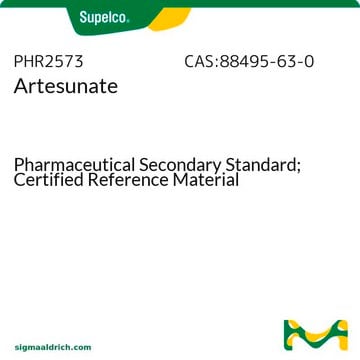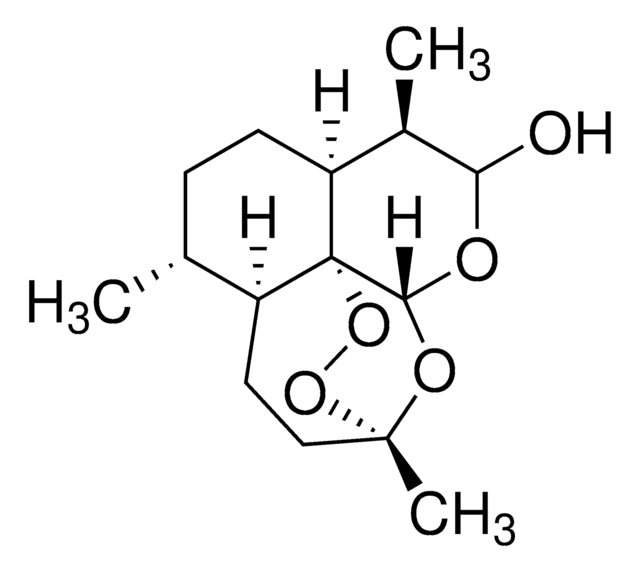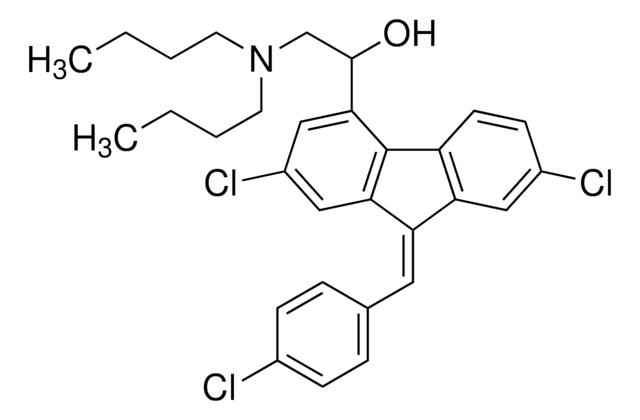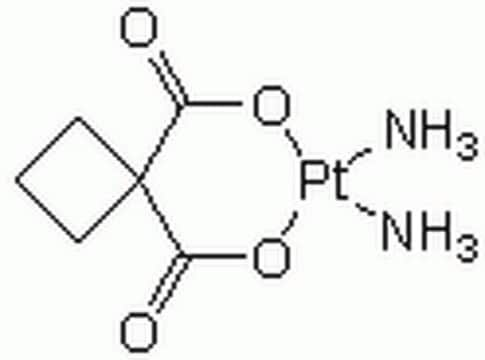A3731
Artesunate
from Artemisia annua
Synonyme(s) :
Artesunic acid, dihydroartemisinine-12-alpha-succinate, succinyl dihydroartemisinin
About This Item
Produits recommandés
Source biologique
Artemisia annua
Niveau de qualité
Forme
crystalline powder
Couleur
white to off-white
Solubilité
acetone: 33.4 mg/mL
Spectre d'activité de l'antibiotique
neoplastics
parasites
Mode d’action
protein synthesis | interferes
Température de stockage
room temp
InChI
1S/C19H28O8/c1-10-4-5-13-11(2)16(23-15(22)7-6-14(20)21)24-17-19(13)12(10)8-9-18(3,25-17)26-27-19/h10-13,16-17H,4-9H2,1-3H3,(H,20,21)/t10-,11-,12+,13+,16+,17-,18?,19-/m1/s1
Clé InChI
FIHJKUPKCHIPAT-JQXDXKTESA-N
Vous recherchez des produits similaires ? Visite Guide de comparaison des produits
Description générale
Application
- Unrevealing the therapeutic potential of artesunate against emerging zoonotic Babesia microti infection in the murine model.: This study explores the efficacy of artesunate in treating Babesia microti infection, a zoonotic disease, in mice. The findings suggest that artesunate significantly reduces parasitemia, indicating its potential as a therapeutic agent for zoonotic infections (Fazilani et al., 2024).
- Antitumour effects of artesunate via cell cycle checkpoint controls in human oesophageal squamous carcinoma cells.: The study investigates artesunate′s antitumor properties in oesophageal squamous carcinoma cells, highlighting its ability to regulate cell cycle checkpoints and inhibit cancer cell proliferation. These findings underscore artesunate′s potential in cancer therapy (Mao et al., 2024).
- 3D printing of multi-unit gastro-retentive tablets for the pulsatile release of artesunate.: This study presents a novel approach to drug delivery using 3D-printed gastro-retentive tablets for the pulsatile release of artesunate. The technology promises improved bioavailability and therapeutic efficacy of artesunate for various medical conditions (Yan et al., 2024).
Actions biochimiques/physiologiques
Autres remarques
Mention d'avertissement
Warning
Mentions de danger
Conseils de prudence
Classification des risques
Acute Tox. 4 Dermal - Acute Tox. 4 Inhalation - Acute Tox. 4 Oral
Code de la classe de stockage
13 - Non Combustible Solids
Classe de danger pour l'eau (WGK)
WGK 3
Point d'éclair (°F)
Not applicable
Point d'éclair (°C)
Not applicable
Équipement de protection individuelle
dust mask type N95 (US), Eyeshields, Gloves
Certificats d'analyse (COA)
Recherchez un Certificats d'analyse (COA) en saisissant le numéro de lot du produit. Les numéros de lot figurent sur l'étiquette du produit après les mots "Lot" ou "Batch".
Déjà en possession de ce produit ?
Retrouvez la documentation relative aux produits que vous avez récemment achetés dans la Bibliothèque de documents.
Les clients ont également consulté
Notre équipe de scientifiques dispose d'une expérience dans tous les secteurs de la recherche, notamment en sciences de la vie, science des matériaux, synthèse chimique, chromatographie, analyse et dans de nombreux autres domaines..
Contacter notre Service technique













